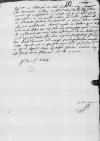List #2073
Ioannes DANTISCUS do Tiedemann GIESEHeilsberg (Lidzbark), 1539-02-17
Regest polski:
Dantyszek sądzi, że przyczyna braku odpowiedzi od rady Torunia leży w tym, że porozumieli się oni z adwersarzami [radą Gdańska], nie chcą jednak, by zostało to ujawnione.
Z podatkiem zamierza postąpić tak samo jak Giese. Inni niech czynią wedle uznania.
Dantyszkowi jest przykro, że nikt z jego współziomków (nemo de nostris) nie ujął się za nim na dworze [w sprawie miejsca zdeponowania pieniędzy z podatku].
Dantyszek nie otrzymał jeszcze nowin o klęsce tureckiej.
Rękopiśmienne podstawy źródłowe:
Publikacje:
| ||||||||
Tekst + aparat krytyczny + komentarz Zwykły tekst Tekst + komentarz Tekst + aparat krytyczny
Reverendissimo in Christo Patri et Domino, domino
Reverendissime in Christo Pater et Domine, frater et amice carissime et honoran(de) or honoran(dissime)⌈honoran(de)honoran(de) or honoran(dissime)⌉.
Salutem et fraternam commendationem.
Quod
Idipsum ... illegible⌈...... illegible⌉ cum contributo facturus sum, sicut Dominatio Vestra Reverendissima statuit. Agant alii suo arbitratu. Hoc tamen male me habet, quod in aula nostra credi debet, ex me solo omnia processisse, cum nemo de nostris vel per unum iota testimonium de me dederit. Sed haec, quemadmodum alia eiusmodi, cf. Adagia 283 Susque deque ⌊susque deque feram etc.cf. Adagia 283 Susque deque ⌋
De clade Turcica nihil accepi, paulo post forsan accepturus.[2] Apud me in praesens novi nihil est scientia Dominationis Vestrae Reverendissimae dignum.
Quae diutissime feliciter valeat.
Ex
Reverendissimae Dominationis Vestrae frater deditissimus


 BCz, 245, p. 130
BCz, 245, p. 130